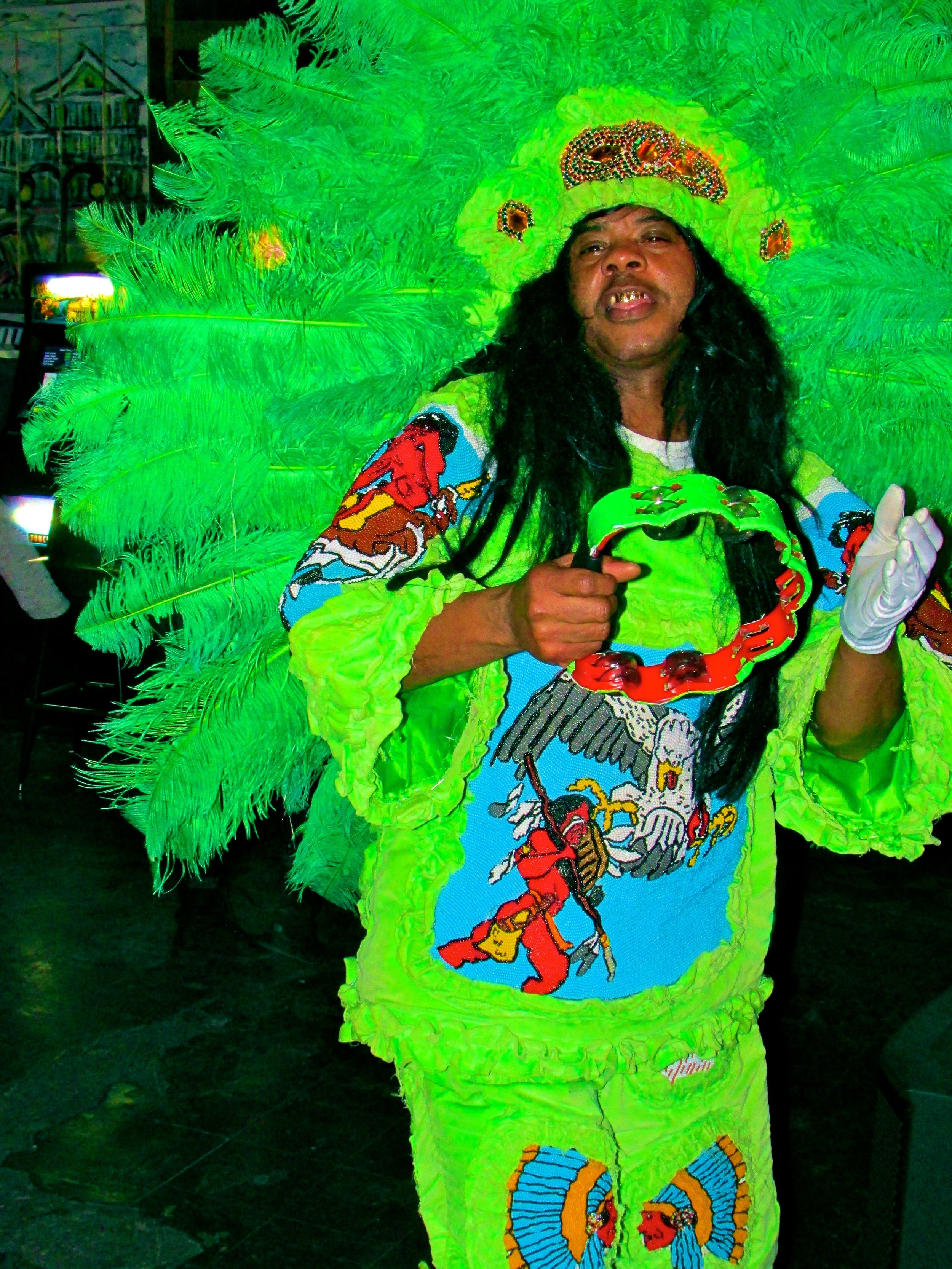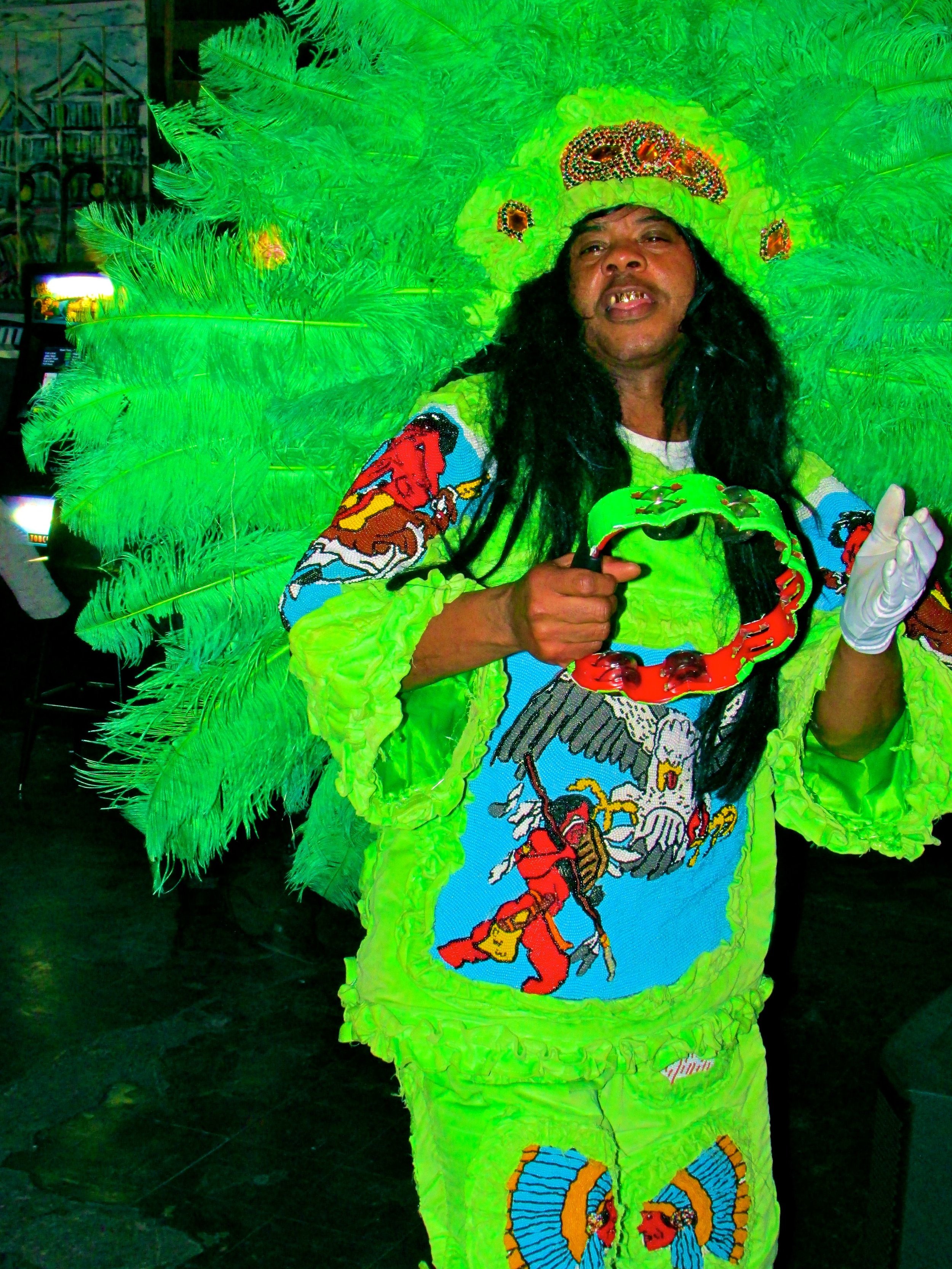Spy Boy Honey
 Name: Spy Boy HoneyHometown: New Orleans, LouisianaAge: 48Age You First Fell in Love: 37Love Is: When I'm happy to see them and being in their company is enough.It is my first night in New Orleans after almost two years and I am happy to be there. My sister and I venture to a small bar on Banks Street, aptly named Banks Street Bar and Grill, where we are meeting a friend of hers. Inside of the small catty-cornered building is a band of five men onstage. The lead singer, dressed in bright green feathers and beads, is a man called Spy Boy Honey. The music is beautiful. The kind you hear only in New Orleans and the kind that always makes me feel at home when I'm there. During intermission we stand outside in a small circle talking."You know, black men weren't allowed to participate in Mardi Gras.", Spy Boy says as we step away from the group. I'd told him the premise of my research and wanted to learn a bit about him and the influence New Orleans had on his life. He proceeds to give me a wonderful history stretching almost two-hundred years. "Slaves weren't allowed in churches, so their masters would leave them in Congo Square every Sunday, and there were exchanges of rhythms and beats, that is why second lines happen on Sundays, it's how it's always been done." For those of you who have never been to New Orleans, second lines are a traditional funeral processional or festive march of sorts; with a brass band leading and a "second line" formed behind them, with either caskets, people dancing, handkerchiefs or parasols in hand.Spy Boy is a member of The Creole Wild West, the oldest documented Mardis Gras Indian gang in New Orleans, "We call them gangs or tribes, it's almost like a cult society, where you learn things that no one else would know.", he goes on about Mardi Gras Indians. "We dress this way to pay homage to the Native American tribes, like the Choctaw, who took us in when we ran away. That's why we call Mardi Gras music Indian music. All the beading and feathers we use, we use to pay tribute to them. We spend all year sewing and Mardi Gras is when we get to show what we've done."The two things I love the most about Spy Boy are how much breathing history lives in one man and his love for New Orleans. "I left New Orleans after the storm and didn't listen to Mardis Gras music for almost nine months. Then one day I heard it and I just started crying. I had to come home, so I came on back to New Orleans." Mardis Gras to most is merely a chance to be belligerently drunk on Bourbon Street; but for Spy Boy, who has been a member of The Creole Wild West since he was six, Mardis Gras is his heirloom. It is the purest connection he has to his ancestors. He is a direct descendant of men who created a culture out of their rejection; a culture that is now a prominent face of New Orleans. Spy Boy Honey in his continuation of such traditions is their living vindication.
Name: Spy Boy HoneyHometown: New Orleans, LouisianaAge: 48Age You First Fell in Love: 37Love Is: When I'm happy to see them and being in their company is enough.It is my first night in New Orleans after almost two years and I am happy to be there. My sister and I venture to a small bar on Banks Street, aptly named Banks Street Bar and Grill, where we are meeting a friend of hers. Inside of the small catty-cornered building is a band of five men onstage. The lead singer, dressed in bright green feathers and beads, is a man called Spy Boy Honey. The music is beautiful. The kind you hear only in New Orleans and the kind that always makes me feel at home when I'm there. During intermission we stand outside in a small circle talking."You know, black men weren't allowed to participate in Mardi Gras.", Spy Boy says as we step away from the group. I'd told him the premise of my research and wanted to learn a bit about him and the influence New Orleans had on his life. He proceeds to give me a wonderful history stretching almost two-hundred years. "Slaves weren't allowed in churches, so their masters would leave them in Congo Square every Sunday, and there were exchanges of rhythms and beats, that is why second lines happen on Sundays, it's how it's always been done." For those of you who have never been to New Orleans, second lines are a traditional funeral processional or festive march of sorts; with a brass band leading and a "second line" formed behind them, with either caskets, people dancing, handkerchiefs or parasols in hand.Spy Boy is a member of The Creole Wild West, the oldest documented Mardis Gras Indian gang in New Orleans, "We call them gangs or tribes, it's almost like a cult society, where you learn things that no one else would know.", he goes on about Mardi Gras Indians. "We dress this way to pay homage to the Native American tribes, like the Choctaw, who took us in when we ran away. That's why we call Mardi Gras music Indian music. All the beading and feathers we use, we use to pay tribute to them. We spend all year sewing and Mardi Gras is when we get to show what we've done."The two things I love the most about Spy Boy are how much breathing history lives in one man and his love for New Orleans. "I left New Orleans after the storm and didn't listen to Mardis Gras music for almost nine months. Then one day I heard it and I just started crying. I had to come home, so I came on back to New Orleans." Mardis Gras to most is merely a chance to be belligerently drunk on Bourbon Street; but for Spy Boy, who has been a member of The Creole Wild West since he was six, Mardis Gras is his heirloom. It is the purest connection he has to his ancestors. He is a direct descendant of men who created a culture out of their rejection; a culture that is now a prominent face of New Orleans. Spy Boy Honey in his continuation of such traditions is their living vindication.
